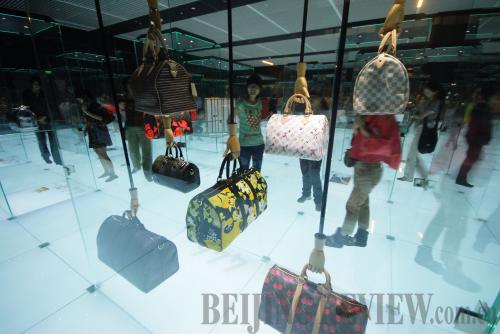|
 |
|
LUXURY'S NEW HOME: Luxury conglomerate LVMH holds an exhibition in Beijing in June 2011 on its brand history. The luxury brand plans to open more stores in China's second-tier cities to boost sales (WEI YAO) |
Where there is luxury, there are Chinese buyers. And when they arrive, cash registers ring incessantly as sale after sale is made.
It's particularly true at luxury shopping outlets worldwide. From Galleries Lafayette in Paris to Harrods in London and premium outlets in New York City, Chinese tourists descend on these locales, often leaving their inventories empty for a few days.
"Chinese tourists are buying up these goods not because they're rich, but because they think the prices are more reasonable and cheaper than in China," said Guo Kai, an economist at the International Monetary Fund and an observer of emerging economies.
China usually imposes 15 to 25 percent tariffs on imported luxury goods. Some are as high as 50 percent for cosmetics and 30 percent for high-end watches. The hefty import duties have pushed up the prices of these goods and driven many Chinese consumers to shop in Hong Kong, Paris and cities in the United States. But the trend is going to be changed.
Yao Jian, spokesman of the Ministry of Commerce (MOFCOM), said on June 15 China would further cut import tariffs, including those on some high-end goods. A 21st Century Economic Herald report said the government will slash import duties by 2 to 15 percent on pricey cosmetics, cigarette and liquor.
But a June 23 report by business news website Caing.com said officials of the Ministry of Finance (MOF) denied future tariff cuts on high-end imports.
"Whether the government introduces luxury import duty cuts is a matter of timing, given the fact China will soon replace Japan as the world's largest luxury market and the huge price discrepancies between luxury products at home and abroad," said Wang Yong, Secretary General of Beijing-based Brand China Industry Union, a platform devoted to branding activities of Chinese industries.
Biggest luxury buyers
China will replace Japan as the world's largest luxury market by 2015, and Chinese customers' spending on luxury items will increase by 18 percent annually to reach $27 billion by that time, from $10 billion in 2009, said a recent report by global management consulting firm Mckinsey & Co. Inc.
Sales data announced by luxury brands such as Louis Vuitton and Burberry supports this prediction. China became Louis Vuitton's largest market in 2009, exceeding South Korea, Japan and the United States. The world's largest luxury conglomerate LVMH reaped nearly 40 percent of its global sales from China last year, or 13 billion yuan ($2 billion), much larger than the 19 percent from Europe and the 23 percent from the United States.
In total, Chinese customers spent 68.4 billion yuan ($10.5 billion) on luxury items last year, said a report on China's 2010 luxury market by management consulting firm Bain &Co., Inc. Most of the total went toward cosmetics, perfume and personal care products, or 16.9 billion yuan ($2.6 billion), and then watches, or 15.5 billion yuan ($2.3 billion) of the total.
But prices of 20 high-end brands of watches, suitcases and handbags, clothes, liquor and consumer electronics at China's mainland market are 45 percent higher than those in Hong Kong, 51 percent higher than U.S. prices and 72 percent higher than French prices, said a MOFCOM survey.
"This is largely due to the huge import duties China imposes on luxury goods," Wang said.
Prices of luxury goods in China have to cover other taxes and fees such as a testing fee at customs, value-added tax, sales tax and consumption tax. For example, China levies 10 percent of tariff, 17 percent of value-added tax and 30 percent of consumption tax on imported perfume, and 65 percent of tariff, 17 percent of value-added tax and 10 percent of consumption tax on some imported wine.
| 